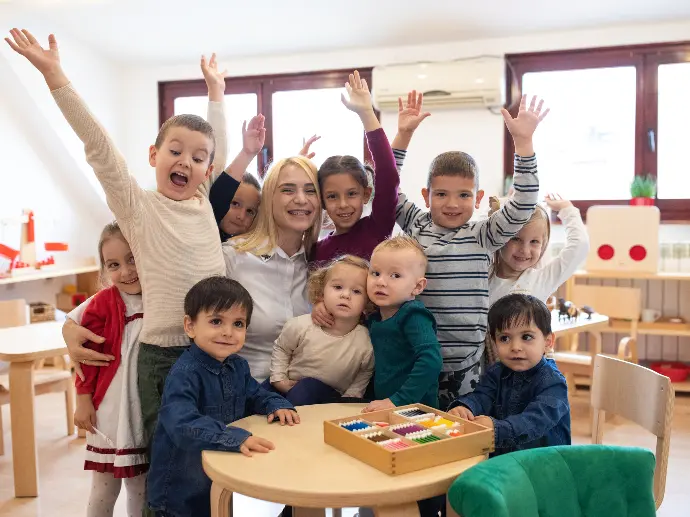About
This evidence-based course is designed specifically for early years educators who want to elevate their supervision skills. This program blends theory with practical strategies to create safe, stimulating environments for children as we break down what supervision truly is, how we go about planning for supervision and what are legal requirements look like in practice. Learn about supervision requirements in Australian legislation and frameworks and how to ensure children thrive through effective supervision while enhancing their learning experiences. With insights and interactive workshopping, you'll leave equipped to foster safe, responsive spaces where every child can flourish.
This workshop will enable you to have a deeper knowledge on how to support children’s individual health and safety through proactive supervision practices. Individual challenges, common misconceptions and myths will be busted and explored with simple, accessible approaches offered. This course is suitable for experienced professionals looking to enhance practice and stimulate ongoing reflection, as well as to professionals brand new to supervising and working with children to create strong foundations for practice.
This Workshop Will Cover the Following Topics
Types of Supervision: From “Absent” to “Active”
Explore the spectrum of supervision styles and understand the crucial shift from being merely present to actively engaged. Discover how different supervision approaches impact children's safety and development, and learn to tailor your style to meet their needs.
Strategies, Ideas, and Suggestions
Equip yourself with innovative strategies to enhance your supervision practices. From risk assessments to engaging interactions, this section will offer practical tips that you can implement immediately in your daily routines.
The Impact of Trauma-Informed Practice
Learn how trauma-informed practices can transform your supervision methods. This topic emphasises understanding children's needs, allowing you to create a responsive and supportive environment that fosters resilience and emotional safety.
Legislative Requirements of Supervision
Explore the legislative requirements of supervision under the National Quality Framework, and the Education and Care Services National Law and Regulations. We’ll cover essential Regulations and how they guide your responsibilities in ensuring the safety and wellbeing of the children in your care.
Common Misconceptions and Myth-Busting
Debunk myths that may be hindering your supervisory effectiveness. From supervision plans, to head counts, or waiting in the doorway between spaces - we will clarify common misunderstandings and provide evidence-based insights to help you approach supervision with confidence and clarity.
The Importance of Relationships and Connection
Discover the vital role that relationships play in effective supervision. Considering the concept of active ad reflective supervision to engage with children in a way that both supports overall supervision and fosters an environment of trust that enhances both safety and learning. Plus side - It is more fun for us as educators as well!
Supervision During Sleep & Rest
Gain insights into best practices for supervising children during sleep and rest periods. Always a challenging topic from cot rooms, to darkened spaces and sleep-aids. This topic will highlight the unique considerations and strategies necessary to maintain safety and care during these essential times in line with legislative requirements.

Participant Outcomes
By the end of this workshop, you will:
- Understand various supervision styles and when to apply them effectively.
- Implement innovative strategies for engaging supervision that enhances children’s learning.
- Recognise the importance of trauma-informed practices in your supervision approach.
- Comprehend and comply with legislative requirements.
- Address misconceptions and challenges with confidence.
- Foster strong relationships that promote trust and learning.
- Develop actionable plans for effective supervision during all activities, including in high-risk moments such as during sleep and rest.
Activities Include:
- Brainstorming: Dive into the essence of supervision and share current strategies as we learn from others.
- Critical Reflection: Engage in thoughtful self-reflections to evaluate the effectiveness of your supervision methods.
- Solutions-Focused Problem-Solving: Collaborate on real-life challenges and craft innovative solutions.
- Action Planning: Create personalised action plans with clear, actionable tasks to implement your new thinking.


This workshop links to the following legislation:
- National Quality Standard (2018)
- Standard 2.2 Each child is protected
- Element 2.2.1 At all times, reasonable precautions and adequate supervision ensure children are protected from harm and hazard.
- Education and Care Services National Law Act 2010
- Section 165: Offence to inadequately supervise children.
- Section 167: Offence relating to protection of children from harm and hazards
- Education and Care Services National Regulations 2011
- Regulation 84A: Sleep and Rest
- Regulation 115: Premises designed to facilitate supervision
Online Course Option
Prefer to engage in this training from the comfort of your own home? We get it!
That's why we created the self-paced online course, with video content and downloadable workbooks.
